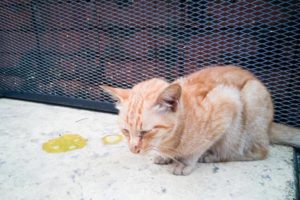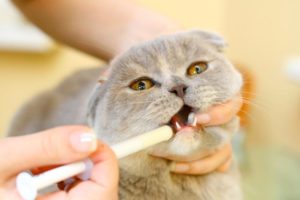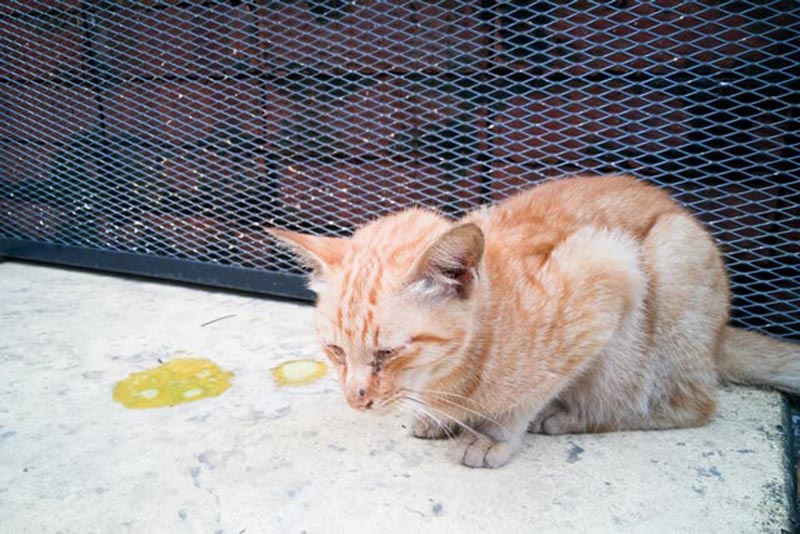As pet owners, we always want the best for our furry friends. However, just like humans, cats can also experience health issues, including digestive problems such as diarrhea. While occasional diarrhea may not be a cause for concern, prolonged diarrhea can be a sign of a more serious underlying issue. In this article, we will discuss the causes of prolonged diarrhea in cats and what you can do to help your beloved pet recover.

Causes of Prolonged Diarrhea in Cats
Diarrhea is a common problem in cats and can be caused by various factors. It is important to identify the root cause of your cat’s prolonged diarrhea in order to provide proper treatment. Generally, diarrhea in cats lasts for about a day and then resolves on its own. However, if it persists for more than a day and is accompanied by other symptoms such as dehydration, weight loss, and lethargy, it is crucial to seek veterinary care immediately.
Common Causes of Prolonged Diarrhea in Cats
- Dietary Changes: Cats are known to have sensitive stomachs, and any sudden changes in their diet can lead to diarrhea. This includes switching to a new brand of food or giving them table scraps that they are not used to.
- Food Intolerance: Just like humans, cats can also have food intolerances or allergies. If your cat has an intolerance to certain ingredients in their food, it can cause diarrhea.
- Parasites: Internal parasites such as roundworms, hookworms, and giardia can cause diarrhea in cats. These parasites can be contracted through contaminated food, water, or contact with infected animals.
- Bacterial or Viral Infections: Cats can also suffer from bacterial or viral infections that can cause diarrhea. These infections can be transmitted through contaminated food, water, or contact with infected animals.
- Inflammatory Bowel Disease (IBD): IBD is a chronic condition that causes inflammation in the digestive tract, leading to diarrhea and other gastrointestinal symptoms.
- Pancreatitis: This is a condition where the pancreas becomes inflamed, causing digestive issues such as diarrhea.
- Medications: Certain medications can cause diarrhea as a side effect in cats. If your cat is on any medication, it is important to consult with your veterinarian about potential side effects.
Treating Prolonged Diarrhea in Cats with Medication

If your cat’s diarrhea persists for more than a day and is accompanied by other symptoms, it is crucial to seek veterinary care. Your veterinarian will perform a physical examination and may also recommend diagnostic tests such as blood work, fecal analysis, and imaging to determine the underlying cause of the diarrhea. Depending on the diagnosis, your veterinarian may prescribe medication to treat your cat’s prolonged diarrhea.
Common Medications Used to Treat Diarrhea in Cats
- Antibiotics: If your cat’s diarrhea is caused by a bacterial infection, your veterinarian may prescribe antibiotics to eliminate the bacteria and reduce inflammation in the digestive tract.
- Anti-inflammatory Drugs: In cases of inflammatory bowel disease or pancreatitis, anti-inflammatory drugs may be prescribed to reduce inflammation and alleviate symptoms such as diarrhea.
- Probiotics: Probiotics are beneficial bacteria that can help restore the balance of good bacteria in the gut. They can be given as supplements or found in certain types of food.
- Dewormers: If your cat’s diarrhea is caused by internal parasites, your veterinarian may prescribe deworming medication to eliminate the parasites.
It is important to follow your veterinarian’s instructions when administering medication to your cat. Always make sure to complete the full course of treatment, even if your cat’s symptoms improve.
Taking Your Cat to the Veterinarian

If your cat’s diarrhea persists for more than a day and is accompanied by other symptoms, it is important to take them to the veterinarian for a proper diagnosis. Your veterinarian will perform a physical examination and may also recommend diagnostic tests to determine the underlying cause of the diarrhea.
What to Expect During a Veterinary Visit
- Physical Examination: Your veterinarian will perform a thorough physical examination of your cat, checking their overall health and looking for any signs of dehydration or weight loss.
- Fecal Analysis: A sample of your cat’s feces will be collected and examined under a microscope to check for the presence of parasites, bacteria, or other abnormalities.
- Blood Work: Blood tests can help identify any underlying health issues that may be causing your cat’s prolonged diarrhea.
- Imaging: In some cases, your veterinarian may recommend imaging tests such as X-rays or ultrasounds to get a better look at your cat’s digestive tract.
Based on the results of these tests, your veterinarian will determine the best course of treatment for your cat’s prolonged diarrhea.
Changing Your Cat’s Diet to Treat Diarrhea
In addition to medication, changing your cat’s diet can also help alleviate their prolonged diarrhea. It is important to consult with your veterinarian before making any changes to your cat’s diet. They may recommend a special prescription diet or provide guidelines for a homemade diet that can help soothe your cat’s digestive system.
Tips for Changing Your Cat’s Diet
- Gradual Transition: When switching your cat’s food, it is important to do so gradually. Sudden changes in diet can cause further digestive upset.
- High-Quality Food: Choose a high-quality, easily digestible food for your cat. Look for brands that are specifically formulated for cats with sensitive stomachs.
- Limited Ingredients: If your cat has food intolerances, look for diets with limited ingredients to help identify the specific ingredient causing the issue.
- Probiotics: As mentioned earlier, probiotics can help restore the balance of good bacteria in your cat’s gut. You can also add probiotic supplements to your cat’s food.
Adding Nutritional Supplements to Your Cat’s Diet

In addition to changing your cat’s diet, adding nutritional supplements can also help alleviate their prolonged diarrhea. These supplements can provide additional nutrients and support for your cat’s digestive system.
Common Nutritional Supplements for Cats with Diarrhea
- Fiber: Adding a small amount of fiber to your cat’s diet can help firm up their stool. However, it is important to consult with your veterinarian before adding any supplements to your cat’s diet.
- Electrolytes: Prolonged diarrhea can cause dehydration, which can lead to an imbalance of electrolytes in your cat’s body. Electrolyte supplements can help replenish these essential minerals.
- Omega-3 Fatty Acids: These fatty acids have anti-inflammatory properties and can help reduce inflammation in the digestive tract.
Conclusion
Prolonged diarrhea in cats can be a sign of a more serious underlying issue and should not be ignored. It is important to seek veterinary care if your cat’s diarrhea persists for more than a day and is accompanied by other symptoms. By identifying the root cause of your cat’s diarrhea and providing proper treatment, you can help your beloved pet recover and prevent any further health issues. Remember to always consult with your veterinarian before making any changes to your cat’s diet or administering medication. With proper care and treatment, your cat will be back to their happy and healthy self in no time.
